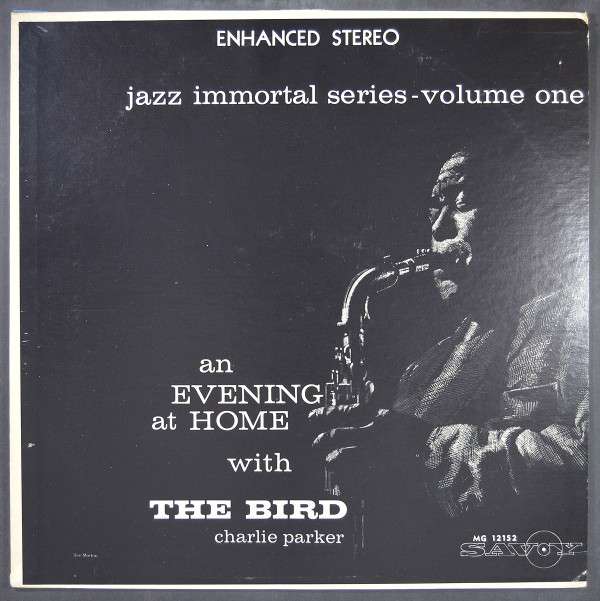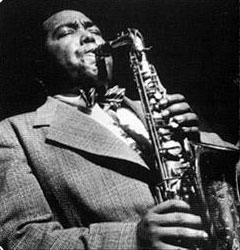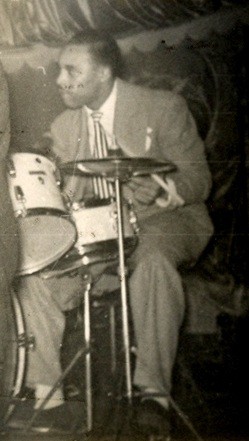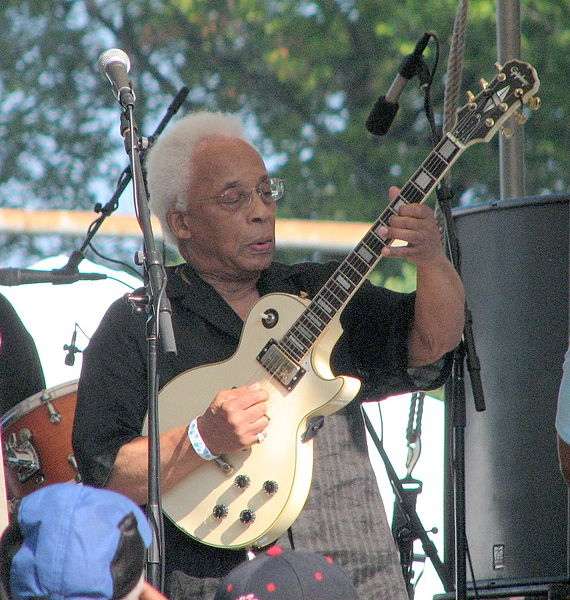
Charlie Parker
An Evening At Home With The Bird
Album US 1961 on Savoy Records label
Jazz (Bop)
Back cover notes in their entirety: "There is a four flight climb to the apartment. On the second landing, the sound of music filters down the steep stairs above midtown. Move on upward, expectantly, thrusting into an overcrowded, overwarm room heavy with smoke. Crowned under a halo of yellowish light, near an unfrocked upright piano, an intense, compact man remolds the contours of a chord progression with uncanny speed and precision. Amid the iridescent faces turned like mirrors toward Bird, standforth those of young jazz immorrtals, their fame secured by exploits in the Bop revolution of the 40's. Charlie Parker's apartment, in the mid 50's. The Bird is having a jam session, a party, an evening at home. And now, as the result of remarkable recording achievement, you are among the invited. This unique album presents the matchless artistry of Charlie Parker in one of the most starkly dramatic, realistic, and musically stimulating contexts in which he was ever recorded: within the uninhibited, infectiously swinging atmosphere of a party actually taking place in Parker's own apartment. His stirring virility and "soul" come brilliantly to life again, with the thrilling impact of musical truth; spontaneous, unrehearsed, uncut. Free of the psychological oppression of a sterile, impersonal recording studio, exhilarated by the enthusiastic support of a "blue chip" audience, Bird's great genius is abetted by a free-wheeling rhythm section and the trenchant humor and drive of a tenorman we believe to be departed jazz giant Wardell Gray. The crowd is electrified by his extended solo on 'Small Hotel.' Savoy had the good fortune of receiving the tapes of this session directly from Charlie Parker, himself. Bird stopped in on one of his many flying trips to the Savoy offices in downtown Newark. He gave only the sketchiest sort of information about the tapes, not even naming the personnel, but promising to write out everything pertinent to the session at his leisure. With this expectation of further information, Savoy president, Herman Lubinsky stowed the tapes away in an old safe. And so they were forgotten. Recently, Savoy was moving form its 100 year old quarters in search of more operating space. While sorting the memorabilia of his first fifty years in the record business, Lubinsky rediscovered the tapes, now a priceless collector's item. Originally, Bird's jam session was recorded on a home tape machine at only 3 3/4 inches per second, drastically below the speed of 15 i.p.s. normally used in professional studios. Also, only one non-professional microphone was utilized, so that only the individual soloists are heard with the dynamic 'presence' of sound which is the hallmark of Savoy recordings. The sound of the rhythm section is occasionally muffled by the joyous chatter of Brid's guests. However, as the result of a superlative electronic restoration via the most modern re-recording and sound equalizing techniques, the remarkable vibrancy and vitality of Charlie Parker's tone have been reclaimed and recreated herein with thrilling results. I believe Charles Christopher Parker, Jr. to be, unequivocally, the greatest instrumentalist yet developed in jazz music. His death on Mark 12, 1955 brings to a dramatic close the first great epoch of jazz, a period beginning with cornetist Buddy Bolden in the New Orleans of the 1890's. The emergence of Parker's introspective, brooding disciple, Miles Davis, as the first member of the original Bop Experiment to achieve broad acceptance in the popular music market, marks the hopeful beginning of a new era of jazz. The overall influence of Parker on the development of jazz has superseded even that of the legendary Louis Armstrong. For many years to come, any alto saxman aspiring to recognition and greatness will still be judged in terms of whether he playsr more or less like Charlie Parker. So radical an improvisator as Ornette Coleman, whose style represent such a marked departure form the melodic and harmonic concepts of the Bop Era, can still receive no higher laurels than to be called 'the new Charlie Parker' by his adherents. With an entirely personal sound, unyielding in tone, technique, or conception to the idiomatic changes in jazz which he experienced in his lifetime, yet in a state of constant development and refinement, Charlie Parker's music remains as startlingly modern and fresh today as it was in the earliest days of the Bop movement. The soaring, breathtaking velocity, the ideational momentum of his opening solo on this album will make you realize that nothing has really changed; that the image of jazz as it stands today, five years after his death, is still Bird's image." -- Tom Wilson
Musicians
 | Charlie Parker as, 1920-1955 US alto saxophone, album by |
 | Leroy Jackson b, US bass |
 | Buzz Freeman dr, *1921 US drums |
 | George Freeman g, *1927 US guitar |
 | Chris Anderson p, 1926-2008 US piano |
 | Claude McLin sax, 1925-1995 US tenor saxophone |
Album Tracks
| No | Title | Artist | Composer | Duration |
|---|---|---|---|---|
| 1 | There's A Small Hotel | Charlie Parker | Rodgers & Hart | 10:51 |
| 2 | These Foolish Things | Charlie Parker | Harry Link, Jack Strachey | 3:54 |
| 3 | Fine And Dandy | Charlie Parker | Kay Swift | 5:58 |
| 4 | Hot House | Charlie Parker | Tadd Dameron | 9:17 |
